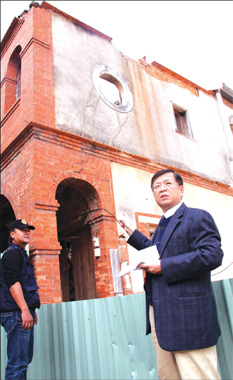Authorities trying to rid elections of 'phantom voters'
Updated: 2009-12-03 07:41
(HK Edition)
|
|||||||
|
A local prosecutor in Kinmen just discovered yesterday that this deserted residential building is registered as a voting household - one of the tricks some local office election candidates employ to gain votes illegally. CNA |
TAIPEI: With three days to go before Saturday's county magistrate and mayoral elections, prosecutors have stepped up efforts to drive out phantom voters, especially in the outlying islands of Kinmen and Matsu.
In the two outlying counties, where the number of voters is small, an election can be decided by a slim margin. Prosecutors said that was all the more reason for them to weed out phantom voters - people who take up residence in local areas four months before the election date for the sole purpose of being eligible to vote for specific candidates.
Some of these voters are paid by people who support particular candidates to become a "voting machine" to sway the election outcome.
The prosecutors started their crackdown several months ago.
In last month alone, the authorities mobilized over 200 policemen, searched 20 residences and summoned 117 people for questioning in two waves of crackdowns to check alleged phantom voters, according to the newspaper China Times.
The reports also cited the prosecutors in saying that the number of the alleged "phantom population" was 3,215 in Kinmen, nearly double the 1,613 in the previous local elections four years ago.
Law enforcement authorities have also found that several hundred phantom voters belonged to the gangster organization "Tian Tao Meng (The Celestial Way)" from Taiwan proper.
In the past, law enforcement officers would simply leave if the houses they visited were locked. But this time, the officers did not give up so easily, but visited the same house for up to four times in half a day, the reports added.
Seven candidates, the most among all 17 cities and counties where elections will be held, are vying for the seat of Kinmen magistrate this year. The battle is therefore being fought more fiercely there than in any other place.
Lee Wo-shih, a candidate nominated by the ruling Kuomintang, even went the distance to campaign in Taipei city and county, where around 60 percent of more than 20,000 eligible Kinmen voters now reside.
The total number of eligible voters in Kinmen is 72,509. Comparatively, the number of eligible voters in Matsu is only 7,697.
Efforts to root out phantom voters in Matsu was also intense.
Lin Ching-tsung, chief prosecutor of Lienchiang Prosecutors Office in Matsu, said that the office began to check the suspected phantom voters beginning in January and has listed 261 such cases, the China Times reported.
Reports also said that the prosecutors are also examining the passenger lists of airliners, ferries as well as the guest lists of hotels and hostels. If suspected persons travel to Matsu, the prosecutors would question them immediately.
With the rampant rumors of phantom voters in Matsu, Lin said his office "is pulling out all the stops to contain their encroachment to ensure a fair and just election."
The number of voters eligible to cast their ballots December 5 to elect city mayors and county magistrates totals 7.05 million, the "Central Election Commission (CSC)" said Tuesday.
The eligible voters in 17 of Taiwan's 25 cities and counties are set to elect mayors and magistrates, city and county councilors, and city and township heads.
Seven other cities and counties - Taipei County, Taichung City, Taichung County, Tainan City, Tainan County, Kaohsiung City and Kaohsiung County - will be upgraded or merged into municipalities and hold elections for local leaders along with Taipei City next year.
CSC officials also noted that the number of eligible voters for township chief elections, which will also be held Saturday, is around 6.23 million, while the other election, for city and county councilors, has 7.03 million eligible voters.
China Daily/CNA
(HK Edition 12/03/2009 page2)
